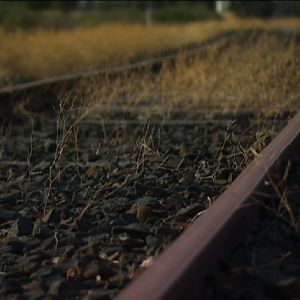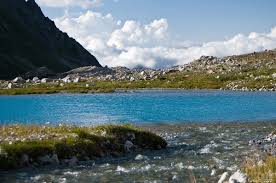 An astonishing tale tinged with sadness, as recounted by the protagonist Yerzhan to a stranger on a train journey across the steppes of Soviet Kazakhstan, that in part continues to be imagined by the listener as from time to time, the young narrator sleeps.
An astonishing tale tinged with sadness, as recounted by the protagonist Yerzhan to a stranger on a train journey across the steppes of Soviet Kazakhstan, that in part continues to be imagined by the listener as from time to time, the young narrator sleeps.
The story begins when the boy enters the carriage playing Brahms on his violin in a manner that causes everyone to stop and look at him, not believing it possible that a boy who looks about ten to twelve-years-old could play to such perfection and with such awe-inspiring panache.
“Then, just as he had the entire carriage gaping after him open-mouthed, he broke off in mid-note. He slung the violin back over his shoulder like a rifle.
‘Wholesome local beverage – entirely organic!’ he exclaimed in a thick, adult voice. He swung a canvas sack down off his other shoulder and pulled out an immense plastic bottle of a yoghurt drink, either ayran or kumis. I approached him, without even knowing why.”
 Yerzhan grows up at a remote railway siding in a part of the country where atomic weapons are tested. Two families live near each other, their lives more intertwined than appears on the surface.
Yerzhan grows up at a remote railway siding in a part of the country where atomic weapons are tested. Two families live near each other, their lives more intertwined than appears on the surface.
Yerzhan and the neighbour’s daughter Aisulu travel many miles by donkey to go to school and many more miles to see the strange but talented bachelor, Petko, a Bulgarian violin teacher.
Every so often the ground shakes, another sun rises and everything is still. Then there is the Zone, that area where it is so silent, his ears ring.
“And the thing that loomed over him like a visceral fear could happen in the middle of the sweltering summer, when sheep suddenly started bleating as if they were under the knife and went dashing in all directions, cows dug their horns into the ground and the donkey squealed and rolled around in the dust…
And a slight rumble would run through the ground, Yerzhan’s legs would start trembling, and then his whole body, and the fear would rise up from his shaking knees to his stomach and freeze there in a heavy ache, until the sky cracked over his head and shattered into pieces, crushing him completely, reducing him to dust, to sand, to scraps of grass and wool. And the black whirlwind hurtled past above him with a wild howl.”
His friend Aisulu’s Granny tells him a story of his conception and birth, intertwined with local legend; not knowing who his father is, he often replays the story in his mind, trying to understand it, and who he is.
“Granny Ulbarsyn’s story wasn’t the only thing that had sunk deep into Yerzhan’s heart. Grandad’s dombra playing stayed with him too. When no one was looking the boy took the instrument down from its nail high up on the wall. And while his grandfather tapped with the hammer on railway carriages, Yerzhan strummed the dombra secretly, imitating the old man’s knitted brows and hoarse voice. It didn’t take long before he picked out a few familiar melodies and then, with the keen eye he used to keep watch on Uncle Kapek’s behaviour, he followed and memorised his granddad’s finger movements.”
 Yerzhan learns the dombra and violin and is bright, but the real light in his life is Aisulu, a light that gradually fades upon his reaching the age of 12, when he walks into the forbidden, radioactive Dead Lake to impress her and from that day on stops growing, destined to watch her pass him by.
Yerzhan learns the dombra and violin and is bright, but the real light in his life is Aisulu, a light that gradually fades upon his reaching the age of 12, when he walks into the forbidden, radioactive Dead Lake to impress her and from that day on stops growing, destined to watch her pass him by.
“Other people noticed it too and wanted to help. Granny Ulbarsyn fed him with the livers of new born spring lambs, Grandad Daulet ordered carrots from the city through his friend Tolegen, and Uncle Shaken brought disgusting fish oil back from his shift. But that only produced a foul-smelling burp! Yerzhan ate it all. But he had stopped growing.”
Another of Peirene Press’s excellent novella’s, this really is an afternoon read, but so rich in the telling, it is a pleasure to go back and reread passages with the familiarity of having read the story. It is a tale tinged with inevitable sadness as people live with the invisible terrors that are an environmental legacy of the Cold War.
If you want to read more contemporary European literature outside the English language, you can do no better than take out a fabulous subscription with Peirene Press. Three novellas a year and the kind you’ll rarely find in most bookshops.
Note: The author Hamid Ismailov was born in Kyrgyzstan and moved to Uzbekistan as a young man. He writes in both Russian and Uzbek and his novels have been translated into many European languages. Sadly his work is banned in Uzbekistan today and he has had to flee the country due to his ‘unacceptable democratic tendencies’.


What am amazing sounding little novella. I still haven’t read any of the Peirene Press books I keep hearing about. Great review.
LikeLiked by 1 person
I think this one is going to be a favourite of a few bloggers I know reading translated fiction, it seems to to have got to a few people. It really is a poignant story and as I read it, I can just imagine seeing it on film, it has that timeless quality to it, the long train journey and the narration of a young man’s life.
You’ll have to get on the Peirene wagon sometime soon! 🙂
LikeLiked by 1 person
I haven’t heard of this author, but this novella sounds incredible. I will definitely seek Ismailov out – thank you!
LikeLiked by 1 person
Hi Claire,I’ve been writing comments on previous posts but these comments don’t reach you. I want to say that I have been reading and enjoying your reviews. I hope this message will reach you. This is a fascinating story and to know that his works have been banned makes me even more interested in reading it. Thank you.
LikeLiked by 1 person
Thank you Julia, I’m sorry your comments don’t come through, this one did! 🙂 I hope you get to see the reply. The Dead Lake is a wonderful piece of literature and I wanted to add that extra note about the author, because it is so rare that we come across work by a writer from lands such as these and to hear of the political fallout makes us appreciate it all the more, I can only imagine how many voices must be silenced. I do hope you manage to find a copy and share it’s sad delights.
LikeLike
I didn’t realize it at first while reading your review, but I have Hamid Ismailov’s The Railway marked as a book to read for Uzbekistan. I hope I enjoy it as much as you enjoyed The Dead Lake!
I am also quite curious as to the significance of the triceratops in your photo of the book!
LikeLiked by 1 person
Oh, I haven’t heard of The Railway, I look forward to hearing how you find it.
Ah yes, the triceratops! Well those ancient creatures are despairing of what man has done to the landscape, looking on in horror, the bones of their ancestors beneath. That and the 11-year-old’s props lying around. 🙂
LikeLiked by 1 person
The Dead Lake sounds like a very engaging read. Ive also gone onto the Pereine Press site and the three novellas for the subscription sound equally fascinating so will give this a go – and as you say not stuff I’m likely to find in my local bookshop!
LikeLiked by 1 person
You know, I almost sent you a personal message to say,
“Yo Col! I think you’ll like this one.” And also to tell you I bought a few copies of The Orenda for Christmas gifts based on your esteemed recommendation back in February and that I’ll be reading it myself in the New Year, knowing its a dead cert.
Hope some good reads turned up under your tree this year. Peirene are great, you’ll even be invited to literary salon – imagine! 🙂
LikeLike
I hope you’ll like The Orenda – having giving it the big build up on many occasions I hope it will live up to your expectations! And my praise! The Pereine Press books sound exactly my kind of stuff so even though you didn’t send that message, the thought of it as a possibility must have reached me subconsciously!
LikeLiked by 1 person
This sounds really interesting Claire! Can it be found on ebook? To bad he had to leave his country. I really hate it when I hear about authors being prosecuted because of what they write about in this day and age. When is that all going to stop? Happy holidays Claire!
LikeLiked by 1 person
Well I just checked and you’re in luck! Only 99c on Amazon.fr such a rarity that there are offers on literary books in English on FR.
Voices being silenced is a long way from ever stopping, long may they find refuge elsewhere.
LikeLike
Pingback: Top Reads 2014 | Word by Word
I’ve put this on my ‘to read’ list; from your description it shares some ideas with Chingiz Aitmatov’s The Day Lasts More Than A Hundred Years. Not much translated literature around from that part of the world.
LikeLiked by 1 person
Pingback: The Dead Lake by Hamid Ismailov | JacquiWine's Journal
Lovely review, Claire, and great quotes especially the one on the Zone. I think this is my favourite of the three Peirene novels from this year’s series. It’s such a poignant and haunting story, beautifully written – almost like a dark fable or folktale in style. I finally got around to writing my review, so I wanted to drop by to see what you thought of this one. I’m glad it struck a chord with you.
LikeLiked by 1 person
Thanks Jacqui, the quotes did work really well for this book and help demonstrate something particular, which hopefully will encourage to seek it out. Probably my favourite of the coming-of-age series too.
Looking forward to reading the Female Voice series in January, just started Beside the Sea today, quite a sad, almost, frightening little novella so far.
LikeLike